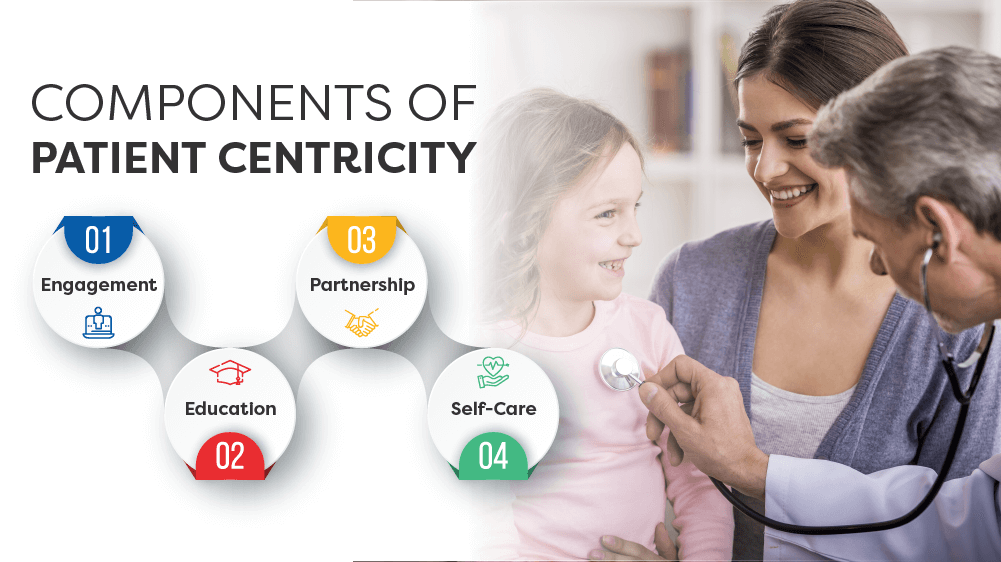Hexaware Acquires SMC Squared, a Leader in Building Global Capability Centers-Rolls Out GCC 2.0 Service Line. Learn More
This website uses cookies. By continuing to browse the site, you are agreeing to our use of cookies
Are Patient Engagement Apps Pharma’s Answer to Delivering Better Experiences?
Today, patient-centricity drives all healthcare-related engagements due to the paramount shift marked by the government, healthcare providers and payers from service/volume-based care to value-based care.
Value-based care places patient experience at its core. A good experience for the patient translates into engaged patients for whom self-care is a priority and adherence is habitual. Engaged patients also provide valuable information by giving feedback on treatment programs, proactively participating in discussions with Health Care Professionals (HCP) / pharma companies, collaborating in clinical trials and helping in optimizing treatments, medical products and services. For pharma and healthcare providers, this also means they can push out more commercially viable products into the market, tailored to meet patient needs.
Patient-centricity is built on empathy for patients. An empathetic understanding of the patient’s needs, wants and experience journey is necessary for a successful value-based care model.

So how can the pharma industry, relatively opaque to ‘outsiders’, heavily regulated, and with a not so convincing history with direct engagement initiatives like apps, deliver great experiences?
How can pharma leverage digital technologies?
Till not very long ago, patients were hardly seen or heard during the course of treatment pathway, with very little say in the type of care delivered, the choice of medicines prescribed or the possibility of participation in clinical trials.
But today, Digital is at the heart of all business activities and it has become imperative to build and deliver innovative and delightful customer experiences for business success. Patients expect the same level of experience at their healthcare providers, similar to what they enjoy from companies like Amazon and Uber.
Despite all the digital influences, good old face-to-face interactions with patient groups and care-giving organizations is still a must to get a deep understanding of patient needs and constraints. Pharma organizations can use these interactions to build awareness about new products and therapies and work towards addressing unmet patient needs while doing their bit to up the digital game.
Interestingly, a strong digital presence underpins all disruptor technologies that have shaken up the foundation of how business is done – think open banking, blockchain and deep learning. So, if pharmaceutical companies do not take the plunge into digital, they might as well be caught napping when market share is threatened by a disruptor. A proactive approach requires you to disrupt your market before an upstart achieves the same.
Also, KPMG says that healthcare is among the top three industries that have the greatest disruption potential in the coming years. Why so? Because the digital transformation journey is still in nascent stages and customer experiences leave room for improvement.
Keeping all of the above in mind, here are some more compelling reasons for pharma companies to consider a patient engagement app.
As a sales augmentation tool for medical representatives
A mHealth app can be a powerful tool for medical representatives during visits to the doctor, clinic or hospital. Mobile patient engagement apps can be customized with product details, benefits, patient adoption and adherence examples and overall outcome details. This helps present a comprehensive picture of the product to the doctor.
Some medical products also come with apps that can be accessed by both the patient as well as the HCP for further improving remote monitoring, accessing verified medical content, utilizing database on disease symptoms and adopting disease management methods. For example, LivingWith: Cancer support from Pfizer and My Dose Coach from Sanofi. These apps are value-enhancing for medical professionals through features like prescription refilling and appointment reminders that help deliver continued care and build patient loyalty.
Build stronger bonds with the providers
Patient engagement apps help providers align the care delivery model with value-based care goals. They also optimize the continuum of care, right from the moment a patient walks into a clinic to effective post-discharge care. This builds patient loyalty and improves engagement.
Patient engagement platforms allow remote monitoring which reduces the need for personal visits and ensures that timely interventions are possible if patient health deteriorates. Improved patient awareness and self-care, and seamless communication between providers and patients become easy.
These facilities are being increasingly adopted by the elderly and people with disabilities, enabling physicians to take care of vulnerable populations better. Apps focused on special therapeutic areas like pain management have gained widespread acceptance due to helpful content and insights, pain trackers, care team communication features and customization options. For example, the PainScale app from Boston Scientific, a medical device manufacturer.
An app partner provides flexibility
Developing and designing an app requires massive investment in terms of time, effort and money. By partnering with already established patient engagement app developers, pharma companies can leverage existing user base, deep technical expertise, customization options and credibility of the patient engagement platform.
Hexaware’s patient engagement app is designed with a focus on patients’ health, well-being, and overall experience across various care areas. With features like omnichannel integration, real-time monitoring, a 360-degree view of patient profiles accessing EHR/diagnostic data, and extensive reporting capabilities, our app meets the needs of pharma companies in diverse therapeutic areas. It offers optimal ways to engage with patients, providers, and caregivers, ensuring a seamless and effective healthcare experience.
Conclusion
To go digital or not is no longer a question to debate. As the digital wave builds and takes over almost all aspects of our lives, it becomes imperative for the pharma industry to leverage the same for improving patient health and building better business models. This will help it to not only anticipate customer wants, meet patient needs and build better products but also compete against potential disruptors on their own turf.
About the Author

Aparna Shamjith
Read more
Related Blogs

How Agentic AI is Transforming Pharma Sales: Hexaware’s Agentic AI Solutions
- Life Sciences & Healthcare
- Generative AI

Top Digital Healthcare Trends Shaping 2025 and Beyond
- Life Sciences & Healthcare
- Digital & Software Solutions

The Impact of Generative AI in Healthcare and HCP Engagement
- Life Sciences & Healthcare
- Digital & Software Solutions

Digital Transformation in Pharma: Revolutionizing Patient Care
- Life Sciences & Healthcare
- Digital & Software Solutions

How Digital Healthcare is Shaping Patient-Centric Care
- Life Sciences & Healthcare
- Digital & Software Solutions

CRM in Pharma Industry: How CRM Assessments are Shaping the Future of Pharma Sales
- Life Sciences & Healthcare

How Life Sciences and Healthcare Content Hubs Can Address Your Biggest Content Challenges
- Life Sciences & Healthcare

From Data to Discovery: Generative AI for Research in Life Sciences
- Life Sciences & Healthcare
- Generative AI

Generative AI for Protocol Authoring in Life Sciences
- Life Sciences & Healthcare
- Generative AI

Generative AI in Life Sciences: From Drug Discovery to Personalized Medicine
- Life Sciences & Healthcare
- Generative AI

Ready to Pursue Opportunity?
Every outcome starts with a conversation







